- Home
- Jon McGregor
The Reservoir Tapes Page 2
The Reservoir Tapes Read online
Page 2
Tony got finished on the phone and said things would get sorted quickly now, and not to worry. Someone from Mountain Rescue would be in and wanting to take them out in the Land Rover, he said. He told them there was a back room available, so they could sit in peace. He nodded at one of the other staff to sort some drinks, asking them what they wanted.
Her name’s Becky, the mother suddenly said. Becky Shaw. Rebecca, really.
Don’t worry, Tony said, as he started leading them off. They’re good lads, Mountain Rescue. They know what they’re doing. They’ll find her.
Vicky thought he might regret saying that. She had a bad feeling already. She got these feelings. It really wasn’t Tony’s place to go offering that kind of a promise.
*
Of course, people started talking then, once Tony had the parents in the back room. The family had been staying up at the Hunters’ new barn conversions, Irene said. She remembered the girl from back in the summer. Irene did the cleaning for most of the holiday lets in the village, and she tended to pick things up as she went. She said the family were from somewhere down south, and she wasn’t sure what the parents did but they seemed like the professional type. Both of them working, so the girl must have been used to going off on her own. She spent a lot of time with Sophie, the Hunters’ daughter. Same age, give or take.
Martin Fowler chipped in and said he remembered the two of them hanging around the village as well. Used to see them with the Broad lad, he said, and Sean Hooper’s son, and what’s his name, Deepak. She was a livewire, someone else said. There was talk of them messing around at the reservoirs. They’d been seen swimming at the quarry.
This type of conversation went on for a while.
One thing Vicky had learnt when she moved up here was that people liked to talk. Information got around quickly, and if people didn’t have actual facts they seemed very capable of filling in the gaps. She’d more than once had to deny being pregnant, after being seen with orange juice in the pub. Saying she didn’t drink wasn’t enough of an answer. Eventually she’d just announced that she was a recovering alcoholic every time someone tried to buy her a pint. That usually put a stop to the questions.
Assumptions were made about her and Graham as well. We’re just colleagues, actually, she often had to say. We’ve known each other a while, we’re good friends, but that’s all. People sometimes had an infuriating way of nodding patiently when she said this, but she’d learnt to let it go.
*
She’d known Graham for a long time. They’d been at college together, when they were younger. They’d studied conservation management, but when the course finished he was the one who moved up to Derbyshire and found actual conservation work. She moved down to London instead, where she worked in bars, went to a lot of parties, and got into a bit of trouble. They kept in touch, on and off. He told her about the work he was doing for the National Park, and encouraged her to visit. She told him stories about what she was up to in London. She’d thought they were funny stories, at the time, but his responses often involved asking if she was really okay.
She never knew how he’d found her in the hospital. She just knew that each time she woke up, and remembered what had happened all over again, he was there. He told her he’d thought something like this was going to happen, and she told him there was no need to be a smart-arse about it.
It hurt when she laughed, for a long time.
People asked, later, what it had felt like to be in a car crash, and she had to say that she had no idea. It wasn’t frightening. She didn’t feel any pain. She was lifted out through the window of her car. She was wet all over, and very cold. There were flashing blue lights. She could remember getting into a fight at a party, but nothing after that. There were a lot of fights, in those days. She wasn’t a good person to be around. People round here wouldn’t believe it, if they knew.
By the time she got out of the hospital, Graham had persuaded her to leave London and move up here. He told her she needed to clear her head, to get back to doing something she loved and get some fresh air in her lungs. He didn’t really take no for an answer. She was surprised by his directness, and she went along with it because she didn’t know what else to do. He was the only one who’d come to see her in the hospital.
*
Usually, when the Mountain Rescue team got up on the hills, they found who they were looking for. They were all local, and they knew the place like their own back yards. They had a good sense of which way people would head when they got lost and in a panic. They knew where people would try and hide when the weather closed in, and where the likely falling places were.
But this was starting to turn out differently.
Vicky and Graham had been asked to open up the visitor centre, for use as an operations base, and over the course of the evening it kept getting busier. The police arrived, and a second Mountain Rescue team were called in. When Vicky brought fresh pots of coffee into the room where they’d spread out the maps she heard someone talk about expanding the search zone, which she guessed meant they had very little idea where the girl might be. It was going to be a long night. There were flashing blue lights outside, and helicopters overhead.
At one point Vicky saw the girl’s parents again, being escorted into the map room by a police officer. They weren’t in there for long, and were soon escorted out again and into a waiting car. A ripple of silence followed them through the building, as though people were afraid to say the wrong thing in their presence. She’d seen something like this before. The way people kept their distance, as if grief was contagious.
She wanted to go out to the car and tell them they weren’t alone. But they were, of course.
She realised that grief was probably the wrong word to use about what was happening just yet. But it had been hours already and the weather was only getting worse.
Irene arrived later in the evening, carrying bags of shopping into the tiny kitchen at the back of the visitor centre. Right then, she said, unpacking the bags. It’s Vicky, isn’t it? I’ve got enough here for six dozen bacon cobs. I’ll slice, you spread.
She looked over at Graham, standing behind Irene. He shrugged, making a face to say that there was no point arguing. They’d got the hang of doing this, communicating with glances and nods, over the heads of colleagues and members of the public. They’d reached a kind of understanding. He passed her the butter, and reached up for the frying pans.
*
By morning there were police vans parked all along the verges down the lane. The road had been closed, and there were torchlights flashing through the beech wood across the way. There were dogs barking.
Graham and Vicky were outside, taking a break, sheltering from the rain under the entrance-way roof. The blue lights and the police radios were making her think of the night of the accident again. Graham asked if she was okay. She looked at him. She wanted a cigarette. She wanted a drink.
I’m fine, she said. Tired.
That would seem reasonable under the circumstances, he said.
They watched more cars pulling into the car park. A helicopter passed by overhead.
I’ve arranged for the Cardwell team to come and take over, he said. I think we’ve done our share. Could I perhaps interest you in some breakfast?
She smiled. She was very cold. Yes, Graham, she said. You can interest me in some breakfast.
*
When they got to the house, Vicky took a shower while Graham started cooking. She was trembling and she felt a little sick and she knew she needed to eat. These were her vulnerable moments. They’d talked about these at the group. She felt bad for worrying about herself, with everything that was going on, but she also knew she had no choice. At the group they talked about putting on your own oxygen mask first.
While she was drying herself she felt dizzy and she had to sit down. Graham had lent her an old fleece and a pair of walking trousers to wear. They smelt musty and they were too big but they were at least clean. She felt co
mfortable in them.
In the kitchen Graham was just putting the breakfast out on the table. The radio was on and they were talking about the missing girl.
Suits you, he said, glancing up at her outfit. She sat down.
She wanted to say something about the girl’s mother. She could feel her eyes starting to sting. She looked at him. There was a question in his expression but she couldn’t read it.
Tea’s in the pot, he said.
3: Deepak
The morning after the girl disappeared there were police going up and down the street, and journalists setting up in the market square. Deepak’s mum said there was no way he was doing his paper round that day.
It’s not safe, Dee Dee, she said. We don’t know what’s happening. You’re staying at home now. Anyone could be out there.
His mum still called him Dee Dee, sometimes. No one else dared.
His dad said there were that many police out there, the street was the safest place to be. He said people would be disappointed if they didn’t get their papers, and he opened the door for Deepak while the two of them were still arguing about it. Deepak headed out.
It was dark outside, and cold. He got his bike out of the shed. There was a misty drizzle which felt like it would soon turn to rain. He pushed his scarf up over his mouth and rode down to the shop to collect the papers. There were people everywhere. He usually had the street to himself, this early. He heard someone say there was a search being organised, up at the visitor centre.
On the news, the police had said they wanted people to keep their eyes open. They wanted to know about anything unusual, any suspicious behaviour, any changes in routine. Any detail could help, they said; no matter how small. It felt like they were talking to him personally. If there was anything to notice, he’d notice it. He was good at that. He knew about people’s routines. When he was doing his paper round he could always tell who was still in bed, who was having breakfast, who had gone out to work already; he noticed when anything was different. They should make him some kind of detective. DCI Deepak had a ring to it.
The Jackson house was the first on his round. Usually a couple of the Jacksons were out in the yard, moving sheep around in the stock shed or loading up the trailer. There was always a smell of bacon and cigarettes, and they never said hello. Place was quiet this morning, though. That was one change in routine to make a note of already.
Irene’s house was next, back up the main street. Her son had special needs and went to a different school. Her lights were always on when he got there, just like this morning, and there was always steam coming out of the tumble-dryer vent under the kitchen window, just like there was now. She was an early starter. Nothing to see here.
The butcher’s shop was empty. Mr Fowler would usually be behind the counter, setting everything out, and would shout hello as Deepak pushed the paper through the letter box. He was friendlier than some. Deepak’s dad thought it was funny that he kept offering to stock halal meat for the family. He’d stop him in the street and go, Vijay, listen, it’s no trouble at all. And Deepak’s dad was always like, mate, we’re not even Muslim, we don’t really eat meat. And then Mr Fowler would forget, and offer again the next time.
After the butcher’s he crossed the square to the pub, the Gladstone, which took four papers. The square was full of police vans and journalists and people just standing around. But there was nothing he could say was suspicious. He carried on up the back lane to Mrs Osborne’s house. It was steep, and the gears on his bike kept slipping. When he got there Mrs Osborne opened the door, as always. Usually she asked if he had any good news for her, like the news was his responsibility or something. But today she just smiled in that old-person sad way and took the paper.
He rolled back down the cobbles and across the square. DCI Deepak had nothing of note to report. He headed up the main street towards the edge of the village, and as he turned into the lane past the allotments he hit a pothole and his chain came off.
Calling headquarters: request mechanical assistance. Would be cool if he could do that. He got off and started fixing the chain back on. He wondered what the police really meant by something unusual, or something suspicious. They said any detail could be vital, but how would you know? Would it be some piece of clothing, like a lost glove on a railing, or like a hairband in the gutter? Or would it be if you saw someone dodgy in a van? Or something really bad, like a tiny bloodstain, or a strand of hair?
It must be pretty hard being a detective.
It was pretty hard being a bike mechanic as well. The chain was wedged between the frame and the sprocket, and he couldn’t get it out. He took his gloves off to try and get a better grip. It was too cold for this kind of thing.
The front door of the house on the corner opened and a man came out. Deepak had seen him around, but he didn’t know him. The man asked if he needed a hand, and Deepak said no, thanks, he was fine. The man stood and watched. It was well awkward. The chain was totally jammed, and he couldn’t get it shifted. It was cutting into his hands when he pulled at it. The man was just watching. It was embarrassing. He was standing too close.
Deepak, lad, he said; I’d say that chain’s stuck. I’ll get some tools.
He went back into the house. Deepak wondered who he was. He pulled at the chain again. Time was getting on.
The man came back out with a toolbox, and budged Deepak out of the way. He said it wouldn’t take a minute. It was all about having the right tool for the job, he said, and gave Deepak a funny look as though he’d told a joke.
He asked if Deepak was surprised that he knew his name. When Deepak said yes, he said: well, I’ve seen you around. You stand out a bit round here.
He did something with a screwdriver and got the chain sorted. It took less than a minute. Deepak said thanks, and went to get back on his bike.
The man said: hang on there a minute, let’s just pop inside and get you cleaned up.
Calling headquarters again: request guidance. Request backup.
The guidance was obvious. Going into a stranger’s house was one of the things you weren’t supposed to do. But this man wasn’t exactly a stranger; he knew Deepak’s name, and Deepak had seen him around. But even so. He could basically hear his mum shouting at him as he walked towards the front door: you don’t even know this man, Dee Dee! It’s not safe, Dee Dee!
She worried too much, though. His dad always said that.
A real detective would take certain measures in this situation. There would be a colleague waiting in a car further down the road. A uniformed officer covering the back door. He would be wearing a wire. As it was, he took mental notes. Just in case. A description of the car parked outside, and the registration number. A description of the house. For example: there were piles of junk mail and free papers just inside the front door. The curtains in all the upstairs windows were closed. The man was wearing a waxed jacket, and trousers with lots of pockets. He was old. Sixty, at least.
Deepak knew he shouldn’t be going inside. But he didn’t want the man to think he was rude, or ungrateful. And anyway, what would he say? I don’t want to come inside in case you’re some kind of massive nonce? You couldn’t go around saying that.
He felt the man’s hand on his shoulder, steering him through the door.
Just head through to the back, he said. Kitchen’s straight ahead. Soap’s by the sink.
It was dark in the hallway, and he had to squeeze past a line of coats and jackets hanging along the wall. Everything smelt damp, and muddy.
This was definitely a bad idea.
He went straight to the sink and started washing his hands. The water was cold, and the bar of soap cracked in half as soon as he picked it up. The sink was full of old dishes. The oil wouldn’t come off. It was just making the two halves of soap filthy. He could hear the man doing something in the hallway. The water coming off his hands was black and going all over the dishes, but the oil wasn’t shifting. He was making a mess of the man’s kitchen. He wante
d to leave now. He was going to be late.
He heard the man in the doorway behind him.
It felt like he was just standing there, watching.
The water was still cold. He turned the tap off and looked around for something to dry his hands with. The place was a mess. His mum would be horrified. Although his mum would be horrified just knowing he was in there. There were more dirty dishes spread along the worktop, and newspapers and magazines stacked up on chairs, and newspaper spread across the table, and on the table there was a gun.
He looked a second time, trying to make it look like he wasn’t looking.
It was definitely a gun.
He didn’t call headquarters in his head this time. There was no backup. He wasn’t a detective. There was a gun on the table. His chest felt very solid all of a sudden, and he more or less stopped breathing for a moment.
But, okay, there were cloths and brushes on the table next to the gun, and some kind of grease or cleaning fluid. There were boxes of cartridges. So it was sort of okay. Sort of normal, round here, more or less normal. He’d never seen a gun before but he knew people owned them. It was a shotgun, probably. It was for shooting rabbits or whatever. It was normal. He pretended he hadn’t seen anything.
The man was still standing in the doorway. He asked if the oil was coming off. Deepak looked. The soap was black with it, and there were oily smears all over the sink. He told the man it was all done, and he’d have to get going. He tried shaking his hands dry. Even if there had been a towel he would have wrecked it.

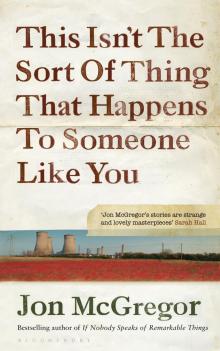 This Isn't the Sort of Thing That Happens to Someone Like You
This Isn't the Sort of Thing That Happens to Someone Like You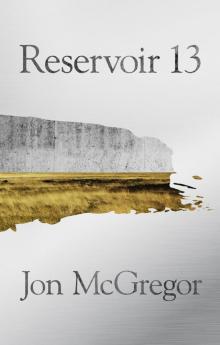 Reservoir 13
Reservoir 13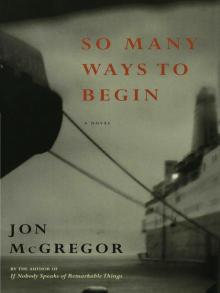 So Many Ways to Begin
So Many Ways to Begin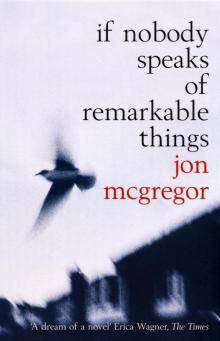 If Nobody Speaks of Remarkable Things
If Nobody Speaks of Remarkable Things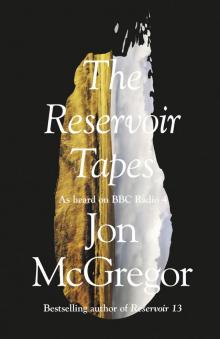 The Reservoir Tapes
The Reservoir Tapes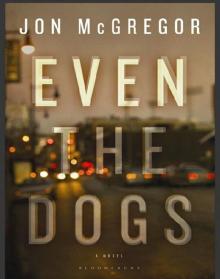 Even the Dogs: A Novel
Even the Dogs: A Novel